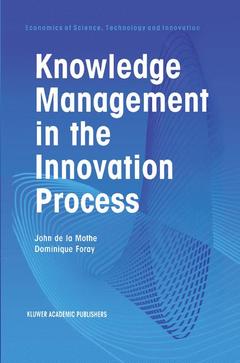Description
Knowledge Management in the Innovation Process, Softcover reprint of the original 1st ed. 2001
Economics of Science, Technology and Innovation Series, Vol. 24
Coordinators: Mothe John de la, Foray Dominique
Language: English
Subjects for Knowledge Management in the Innovation Process:
Knowledge Management in the Innovation Process
Publication date: 11-2012
262 p. · 15.5x23.5 cm · Paperback
Publication date: 11-2012
262 p. · 15.5x23.5 cm · Paperback
Knowledge management in the innovation process
Publication date: 08-2001
262 p. · 15.5x23.5 cm · Hardback
Publication date: 08-2001
262 p. · 15.5x23.5 cm · Hardback
Description
/li>Contents
/li>
It is now widely recognized that many of the central unresolved problems in economic policy, management and research turn on questions of knowledge. Increasingly, complex firms and agencies must ask, and answer, such difficult questions as:
Knowledge Management in The Innovation Process - a joint project between Statistics Canada and Program of Research on Innovation Management and Economy (PRIME) at the University of Ottawa - brings together economic, social, measurement and policy views on these critical issues. This project fits into an ongoing research program at Statistics Canada to develop meaningful indicators for science, technology and innovation in a technology-intensive economy. It also fits into the ongoing program at PRIME to better understand technology policy and innovation strategy. This book tells the story of the dynamic interplay between knowledge and innovation with an eye to developing tools and frameworks for managing knowledge for social and economic benefit.
- What is knowledge?
- Where is it? Who has it?
- Does the organization lose or gain competitive advantage or effectiveness by sharing knowledge?
- Where can we find the knowledge we need?
- How can we measure knowledge?
Knowledge Management in The Innovation Process - a joint project between Statistics Canada and Program of Research on Innovation Management and Economy (PRIME) at the University of Ottawa - brings together economic, social, measurement and policy views on these critical issues. This project fits into an ongoing research program at Statistics Canada to develop meaningful indicators for science, technology and innovation in a technology-intensive economy. It also fits into the ongoing program at PRIME to better understand technology policy and innovation strategy. This book tells the story of the dynamic interplay between knowledge and innovation with an eye to developing tools and frameworks for managing knowledge for social and economic benefit.
I: Introduction.- 1. Approaching the Management of Knowledge.- II: Frameworks.- 2. Visions, Technology, and Organizational Knowledge: An Analysis of the Interplay Between Enabling Factors and Triggers of Knowledge Generation.- 3. Continuities and Ruptures in Knowledge Management Practices.- III: Measurement.- 4. Creativity, Innovation and Business Practices in the Matter of Knowledge Management.- 5. Knowledge Flows From Public Institutions to Firms.- 6. Knowledge Management in Small Firms: Theoretical Perspectives and Evidence.- 7. Managing Surveys on Technological Knowledge: The French Experience in the Nineties.- IV: Impacts.- 8. Practice and Knowledge Management.- 9. Knowledge Management at NRC: A Practical Perspective to KM.- 10. Investing Knowledge in Universities: Rethinking the Firm’s Role in Knowledge Transfer.- 11. The Grammar of Productive Knowledge.- 12. Knowledge, Learning and Innovation Policy.- V: Conclusion.- 13. Conclusion.
© 2024 LAVOISIER S.A.S.
These books may interest you

Information, Innovation and Impacts 105.49 €



